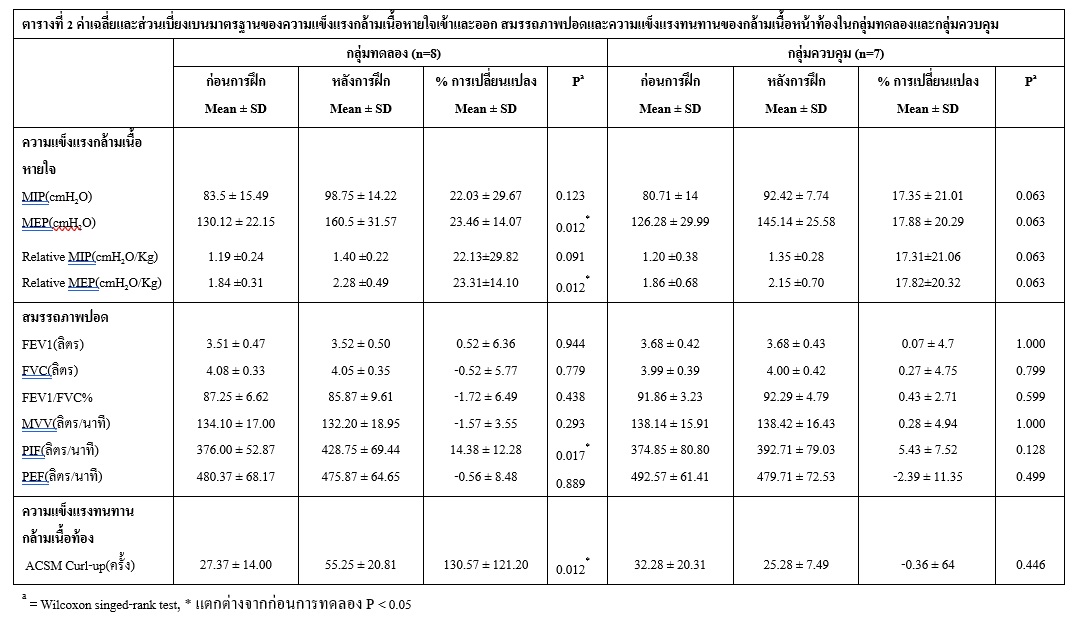EFFECT OF ABDOMINAL MUSCLE TRAINING ON EXPIRATORY MUSCLE STRENGTH AND LUNG FUNCTION IN COLLEGE MALE STUDENT SMOKERS
Main Article Content
Abstract
Background : The rate of smoking among young people has increased steadily over the past decades. Previous research indioated that smokers have lower expiratory muscle strength than non-smokers, thereby affecting lung function. Abdominal muscle training has been shown to improve respiratory muscle strength. Therefore, the abdominal muscles training, as an alternative intervention, could benefit on respiratory muscle and lung function in young smokers.
Objective : To evaluate the effect of abdominal muscle training on expiratory muscle strength and lung function in male early adulthood smoker.
Method : A total of 15 healthy male smokers, aged 18-22 years old, were randomly divided into 2 groups: an experimental group (8 men) and a control groups (7 men). The experimental group performed abdominal muscle training 2 days per week for 8 weeks while the control group received no treatment. All participants completed respiratory muscle strength test, lung function test and abdominal muscle strength test before and after 6-week of training.
Results : After training, the maximum expiratory pressure (MEP) was significantly increased in the experimental group (p = 0.012), but not in control group, when compared to pre-training. Neither the maximum inspiratory pressure (MIP) nor lung function were affected after training in both groups. After training the abdominal muscle strength in the experimental group was significantly increased when compared to before training and control group (p = 0.021).
Conclusion : A 8-week of abdominal muscle training had a small effect on expiratory muscle strength and lung function in college student smokers. Nevertheless, there was a trend for the expiratory muscle strength and abdominal muscle strength to be improved after training compared to control.
Article Details
References
Aliverti, A. (2016). The respiratory muscles during exercise. Breathe (Sheffield, England), 12(2), 165-168.
Bostanci, Ö., Mayda, H., Yılmaz, C., Kabadayı, M., Yılmaz, A. K., & Özdal, M. (2019). Inspiratory muscle training improves pulmonary functions and respiratory muscle strength in healthy male smokers. Respiratory Physiology and Neurobiology, 264, 28-32.
Cohen J. (1988). Statistical Power Analysis for the Behavioral Sciences. New York, NY: Routledge Academic. Ferguson, B. (2014). ACSM’s Guidelines for Exercise Testing and Prescription 9th Ed. 2014. The Journal of the Canadian Chiropractic Association, 58(3), 328-328.
Gold, D. R., Wang, X., Wypij, D., Speizer, F. E., Ware, J. H., & Dockery, D. W. (1996). Effects of cigarette smoking on lung function in adolescent boys and girls. New England Journal of Medicine, 335 (13), 931-937.
Inoue-Choi M., Liao L.M., Reyes-Guzman C., Hartge P., Caporaso N., Freedman N.D. Association of Long-term, Low-Intensity Smoking With All-Cause and Cause- Specific Mortality in the National Institutes of Health-AARP Diet and Health Study. JAMA Internal Medicine. 2017;177(1):87-95.
Inthachai, T., Demekul, K., Phonsatsadee, N., Puttitommagool, P., & Boonyachart, N. (2019). Effects of physical activity and smoking on cardio-ankle vascular index, respiratory muscle strength, and exercise performance in early normal weight adulthood: a cross-sectional study. Journal of Exercise and Rehabilitation, 15(6), 804-810.
Ishida, H., Fujisawa, M., Yokoyama, R., Suehiro, T., & Watanabe, S. (2017). Electromyographic activities of the abdominal muscles during 30% and 75% of maximum expiratory pressure. Journal of Bodywork and Movment Therapies, 21(4), 794-797.
Ito, K., Nonaka, K., Ogaya, S., Ogi, A., Matsunaka, C., & Horie, J. (2016). Surface electromyography activity of the rectus abdominis, internal oblique, and external oblique muscles during forced expiration in healthy adults. Journal of Electromyography and Kinesiology, 28, 76-81.
Laveneziana P., Albuquerque A., Aliverti A., Babb T., Barreiro E., Dres M., Dubé B.P., Fauroux B., Gea J., Guenette J.A., Hudson A. L., Kabitz H.J., Laghi F., Langer D., Luo Y.M., Neder J. A., O’Donnell D., Polkey M.I., Rabinovich R.A., Rossi A., Series F., Similowski T., Spengler C.M., Vogiatzis I, Verges S.(2019). ERS statement on respiratory muscle testing at rest and during exercise. European Respiratory Journal . 53, 01214-2018
Maeo, S., Takahashi, T., Takai, Y., & Kanehisa, H. (2013). Trunk muscle activities during abdominal bracing: comparison among muscles and exercises. Journal of Sports Scince and Medicine, 12(3), 467-474.
Magni, C., Chellini, E., Lavorini, F., Fontana, G. A., & Widdicombe, J. (2011). Voluntary and reflex cough: similarities and differences. Pulmonary Pharmacology Therapeutics, 24(3), 308-311.
Miller, M. R., Hankinson, J., Brusasco, V., Burgos, F., Casaburi, R., Coates, A., Wanger, J. (2005). Standardisation of spirometry. European Respiratory Journal, 26(2), 319-338. Oliva-Lozano, J. M., & Muyor, J. M. (2020).
Core Muscle Activity During Physical Fitness Exercises: A Systematic Review. International Journal of Environmental Research and Public Health, 17(12), 4306.
Park, J. H., Kang, S.-W., Lee, S. C., Choi, W. A., & Kim, D. H. (2010). How respiratory muscle strength correlates with cough capacity in patients with respiratory muscle weakness. Yonsei Medical Journal, 51(3), 392-397.
Rexhepi, A., & Brestovci, B. (2008). Influence Of Smoking And Physical Activity On Pulmonary Function. Internet Journal of Pulmonary Medicine, 11.
Rodriguez, N.I.,Alarcon, S.M.,Gutierrez,G.C., Hermosilla, R.P., Contreras, G.T., Baez, R.C. (2014). Efecto del entrenamiento de músculos abdominales sobre la función respiratoria en adolescentes sanos: Estudio piloto. Revista chilena de enfermedades respiratorias., 30, 203-211.
Willett, G. M., Hyde, J. E., Uhrlaub, M. B., Wendel, C. L., & Karst, G. M. (2001). Relative activity of abdominal muscles during commonly prescribed strengthening exercises. Journal of Strength and Conditioning Reserch, 15(4), 480-485.


